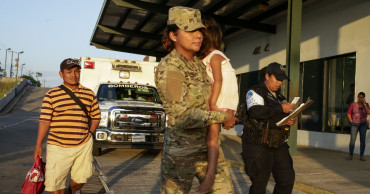Panama
Panama plans big boost for film industry to attract global shoots
Panama is setting the stage for a major transformation in its film industry, driven by a new wave of leadership under President José Raúl Mulino. A dynamic, largely female-led team is spearheading efforts to position the country as a prime destination for international productions.
At the forefront is Vice Minister of Culture Arianne Benedetti, a filmmaker and former film commissioner who played a key role in shaping Panama’s 2012 film law, according to Variety.
“We’re working to enhance all forms of incentives – from infrastructure and labour support to expanded cash-back offers,” Benedetti said. A new incentive aimed at attracting gaming producers is also in development.
One of the core proposals is to increase the current 25% cash rebate for international shoots to 30% or even 35%. At the same time, officials are pushing for a boost in funding for the Panamanian Film Fund, which backs local productions. There are also plans to revive MEET, the country’s co-production forum, later this year.
Benedetti highlighted Panama’s growing international presence. The country will be a special focus at the 2025 Malaga Film Festival, and its producers will participate in events such as Spain’s Ventana Sur and Berlin’s European Film Market (EFM), where Panama will have a national stand for the first time.
‘Squid Game’ star O Yeong-su sentenced to one year in prison for indecent assault
Speaking at the Panama International Film Festival (IFF Panama), Benedetti and newly appointed film commissioner Maria Cecilia Arias shared plans to attract a foreign partner to build a film studio in Panama.
A feasibility study for the project is expected within the next two months. Last year, the team travelled to London and Los Angeles to meet with potential investors, including a company from Spain.
Arias emphasised Panama’s appeal for filmmakers, with its beaches, jungles, and mountains offering versatile backdrops that can double for cities like New York, Miami, or Dubai. The country’s compact geography also makes logistics easier for production crews.
10 months ago
Deportees from US seek asylum in Panama
Migrants from Afghanistan, Russia, Iran, and China, deported from the United States and left in limbo in Panama, have been moving from one embassy and consulate to another this week, desperately trying to secure asylum in any country willing to take them.
Once the focus of international humanitarian attention just weeks ago, the deportees now fear that, with minimal legal and humanitarian aid and no clear path forward from authorities, they may soon be forgotten.
Asian shares mixed as Wall St dips on US uncertainty
“After this, we have no idea what we will do,” said 29-year-old Hayatullah Omagh, who fled Afghanistan in 2022 following the Taliban’s takeover.
In February, the United States deported nearly 300 people from predominantly Asian nations to Panama. The Central American country was intended as a transit point for migrants from countries that were difficult for the U.S. to deport to, as the Trump administration sought to expedite removals. While some agreed to return to their home countries voluntarily, others, fearing persecution, refused and were sent to a remote camp in the Darién jungle for several weeks.
Earlier this month, Panama released the remaining migrants from the camp, giving them one month to leave the country. The government stated that they had declined assistance from international organisations, opting instead to make their own arrangements. However, with limited financial resources, no familiarity with Panama, and little to no knowledge of Spanish, the migrants have struggled.
Seeking asylum from one embassy to another
On Tuesday, around a dozen migrants visited foreign diplomatic missions in Panama’s capital, including the Canadian and British embassies as well as the Swiss and Australian consulates, hoping to initiate the asylum process. However, they were either turned away or advised to contact the embassies via phone or email. Their messages often received no response or a standard reply stating that the embassies could not assist them.
In one email, Omagh explained the reasons for his escape, pleading, “Please don’t let me be sent back to Afghanistan, where survival is impossible for me.”
The response from the Canadian Embassy in Panama stated, “The Embassy of Canada in Panama does not offer visa or immigration services, nor services for refugees. We are also not permitted to answer any questions regarding visas or immigration.”
At the British Embassy, a security guard handed the asylum-seekers a leaflet titled “Emergency Help for British People.” Meanwhile, at the Swiss consulate, the group was directed to contact the embassy in Costa Rica and given a printed sheet with general phone numbers and email addresses from the embassy’s website.
Canadian, British, and Australian diplomats in Panama did not respond to requests for comment from The Associated Press. The Swiss consulate denied claims that they had turned away the asylum-seekers.
Heathrow Airport to shut down Friday after rire causes power outage in London
Stuck in limbo in Panama
The migrants had travelled halfway across the world, reached the U.S. border to seek asylum, and instead found themselves stranded in Panama—a country some had already passed through months earlier on their journey north.
Many of the deportees expressed willingness to seek asylum in Panama but were informed by both international aid groups and Panamanian authorities that obtaining refuge in the country would be difficult, if not impossible.
Álvaro Botero, who advocates for the migrants at the Inter-American Commission on Human Rights, said he was not surprised that embassies refused assistance, as such aid is typically reserved for extreme cases of political persecution. He also suggested that other governments may be reluctant to intervene due to potential diplomatic tensions with the Trump administration.
“It’s critical that these individuals are not forgotten,” Botero said. “They never chose to be sent to Panama, and now they are stranded with no idea of what to do, uncertain about their future, and unable to return home.”
Simultaneously, the Trump administration has restricted legal pathways at the U.S. southern border, intensified deportations, and suspended both its refugee resettlement programme and funding for organisations that could have supported the migrants now trapped in Panama.
Over the weekend, the Trump administration deported more than 200 Venezuelan migrants to El Salvador, detaining them in a maximum-security gang prison. Officials alleged—without providing evidence—that the individuals were members of the Venezuelan Tren de Aragua gang.
Few options left
On Thursday, the migrants visited the Panama offices of the U.N. refugee agency. Omagh reported that officials there informed them they could not assist with asylum in other countries due to restrictions imposed by the Panamanian government. A U.N. official told them they could begin the asylum process in Panama but warned that it was highly unlikely their claims would be accepted.
The U.N.'s International Organization for Migration and the refugee agency did not immediately respond to the AP’s request for comment.
That same day, Filippo Grandi, head of the U.N. refugee agency, cautioned that U.S. government aid cuts would have a detrimental effect on refugee services worldwide.
“We urge member states to fulfil their commitments to displaced people. This is a time for solidarity, not retreat,” Grandi stated.
Deportees, including Omagh, fear that foreign governments and aid organisations are turning their backs on them.
Omagh, who is both an atheist and a member of Afghanistan’s Hazara ethnic minority, believes returning home under Taliban rule would mean certain death. Before attempting to reach the U.S., he had spent years trying to settle in Pakistan, Iran, and other countries, only to be denied visas.
Russian migrant Aleksandr Surgin, also part of the group seeking help at embassies, fled his country after openly criticising the war in Ukraine on social media. He was warned by government officials that he would either be imprisoned or forced to fight in Ukraine.
When asked on Thursday what he planned to do next, he simply replied, “I no longer have any hope.”
11 months ago
Panama Canal administrator pushes back against Trump's assertions of Chinese meddling
The administrator of the Panama Canal said Friday that the vital waterway will remain in Panamanian hands and open to commerce from all countries, rejecting claims by President-elect Donald Trump that the United States should take it over.
In an interview with The Associated Press, Ricaurte Vásquez denied Trump’s claims that China was controlling the canal’s operations, and said making exceptions to current rules concerning its operation would lead to “chaos.”
He said Chinese companies operating in the ports on either end of the canal were part of a Hong Kong consortium that won a bidding process in 1997. He added that US and Taiwanese companies are operating other ports along the canal as well.
Trump has gone so far as to suggest the US should take back control of the canal and he would not rule out using military might to do so.
“It might be that you’ll have to do something,” Trump said Tuesday. “The Panama Canal is vital to our country.” Trump has characterized the fees for transiting the canal that connects the Atlantic and Pacific Oceans as “ridiculous.”
Panama prepares to evacuate first island in face of rising sea levels
Panama President José Raúl Mulino has said unequivocally that the canal will remain in Panamanian hands.
Responding to the suggestion that the US could try to retake control of the canal, Vásquez said there was “no foundation for that sort of hope. That is the only thing I can say.”
Vásquez stressed that the Panama Canal was open to the commerce of all countries.
The canal can’t give special treatment to US-flagged ships because of a neutrality treaty, Vásquez added. “The most sensible and efficient way to do this is to maintain the established rules.”
Requests for exceptions are routinely rejected, because the process is clear and there mustn’t be arbitrary variations, he said. The only exception in the neutrality treaty is for American warships, which receive expedited passage.
Some 70% of the sea traffic that crosses the Panama Canal leaves or goes to US ports.
The United States built the canal in the early 1900s as it looked for ways to facilitate the transit of commercial and military vessels between its coasts. Washington relinquished control of the waterway to Panama on Dec. 31, 1999, under a treaty signed in 1977 by President Jimmy Carter.
Last month, Trump told supporters “We’re being ripped off at the Panama Canal.” He claimed that the US “foolishly gave it away.”
Regarding the fees for using the canal, Vasquez said a planned series of increases had concluded with one this month. Any additional increases would be considered in the first half of the year to give clients certainty in their planning and would go through a public comment process, he said.
Panama inaugurates third bridge over Panama Canal
“There’s no discrimination in the fees,” he said. “The price rules are uniform for absolutely all those who transit the canal and clearly defined.”
The canal depends on reservoirs to operate its locks and was heavily affected by drought during the past two years that forced it to substantially reduce the number of daily slots for crossing ships. With fewer ships using the canal each day, administrators increased the fees that are charged all shippers for reserving a slot.
The canal bisects Panama, running 51 miles end to end. It allows ships to avoid the longer and costlier trip around Cape Horn at the tip of South America.
“It is an enormous responsibility,” Vásquez said of Panama’s control of the canal. “Take the case of COVID, when it arrived, the canal took the necessary measures to protect the labor force, but while keeping the canal open, because the international commitment is to keep it open.”
1 year ago
At least 39 migrants dead in bus crash in Panama
At least 39 migrants were killed and about 20 were injured early Wednesday when the bus they were riding in western Panama tumbled off a cliff, authorities said.
Officials did not immediately report nationalities, but the migrants had crossed the treacherous Darien Gap from Colombia.
The Panamanian government typically moves migrants who have crossed the Darien to a camp near the Costa Rica border on the other side of Panama. The migrants pay for the bus tickets, but the buses are only for migrants. There are usually two drivers, as well as personnel from the National Immigration Service.
Samira Gozaine, director of Panama’s National Immigration Service, said it appeared the bus driver had passed the entrance to a shelter in Gualaca and when he tried to turn around to get back on the highway, the bus collided with another bus and went off the cliff.
Images from the scene showed a broken guardrail on a curve in a forested area just a couple hundred yards beyond the shelter. The bus was carrying 66 migrants to the Los Planes shelter.
Also read: Official: 17 people killed in bus-truck crash in NW Pakistan
Ambulances carried the injured to the nearest hospital in David.
“This news is regrettable for Panama and for the region,” President Laurentino Cortizo said via Twitter.
It was the worst accident involving migrants in Panama in at least a decade. The flow of migrants through Panama surged in recent years as more risked the dangerous crossing as they tried to make their way north to the United States.
Last year, nearly 250,000 migrants crossed the Darien jungle – the majority Venezuelans – a record number that nearly doubled the total from the previous year. In January, more than 24,000 migrants crossed Darien, mostly Haitians and Ecuadoreans, according to Panamanian authorities.
3 years ago
US downs Panama 8-0 in Olympic qualifying tournament
Lindsey Horan scored three goals and the US national team downed Panama 8-0 on Friday night in the the group stage of the CONCACAF Women's Olympic Qualifying tournament.
6 years ago
Costa Rica downs Panama 6-1 in Olympic qualifying tournament
Melissa Herrera and Priscilla Chinchilla each scored two goals and Costa Rica beat Panama 6-1 on Tuesday to open the CONCACAF Women's Olympic Qualifying tournament.
6 years ago
Panama: 7 killed, 14 tortured in exorcism terror rituals
Seven people were killed in a bizarre religious ritual in a jungle community in Panama, in which indigenous residents were rounded up by about 10 lay preachers and tortured, beaten, burned and hacked with machetes to make them "repent their sins," authorities said Thursday.
6 years ago
Death toll in Panama prison shooting climbs to 14
Panamanian authorities said Wednesday another two inmates died following a clash between rival gangs at the La Joyita prison in eastern Panama City, bringing the death toll to 14.
6 years ago















